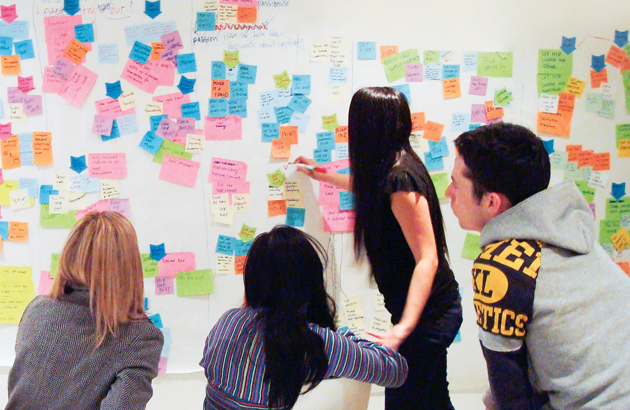Gift helps establish soft-skills research unit at Rotman

A gift from Richard Nesbitt has helped launch the Mind Brain Behaviour Hive at the Rotman School of Management.
Posted on June 29, 2015
Richard Nesbitt (MBA 1985), President and CEO of the Global Risk Institute in Financial Services, has made a generous gift to kick-start the Mind Brain Behaviour Hive (MBBH) at the Rotman School of Management, a research program which uses hard sciences to analyze soft skills at the individual level.
“Soft skills cannot be developed in the same way that skills for solving, for example, equilibrium prices and quantities,” says Professor Mihnea Moldoveanu, Rotman’s vice-dean of Learning, Innovation and Executive Programs. “These skills have to be developed through constant personalized feedback.”
Moldoveanu says soft skills range from finding the right time to look a client in the eye to knowing when to change the subject or sensing the need to bring your voice down a notch or two.
Many of us suppose that soft skills just come naturally to certain people and cannot be measured, let alone taught. Moldoveanu passionately believes the contrary. He is certain also that the Mind Brain Behaviour Hive, a research unit drawing on the expertise of multiple departments and faculties, will measure these skills and make it possible to teach them with unprecedented precision.
The introduction of hard science to the soft-skills arena is possible today for a few reasons. Advances in the study of the brain now allow researchers to be precise about personality traits like self-control and empathy.
As well, Moldoveanu says that technology has made the gathering of data easy and affordable. Instruments such as the Apple iWatch, for example, give students very precise feedback on what they’re feeling, what their mind is doing, what their eyes are doing, and what they’re sensing at any particular time.
Perhaps most importantly, research today is a collaborative enterprise. The MBBH will draw on psychology and computer science in the Faculty of Arts & Science as well as the resources of the Rotman School and the Faculty of Music.
“Musicians’ brains can solve complicated problems, such as sight reading music,” Moldoveanu says. “There is a large amount of literature that suggests that being musically educated allows you to be better at decoding the tone of a person’s voice.”
Moldoveanu compares the MBBH’s approach to the trend in contemporary medicine towards personalized diagnosis and treatment. No longer is it adequate to analyze hypotheticals from a distance.
“We want to understand from each student, from each participant, what he or she wants to accomplish, and then give them feedback about whether what they are doing furthers their own goals,” he says.
At the MBBH, the science is clinical in nature: brain waves will be monitored through EEGs, heart rates by EKGs. Tone, pitch and rhythm of voice, blood pressure and skin conductance are part of the measurement suite. Fifteen minutes of individual input and data collection of this type may yield a one hour coaching session in which the participant will become aware of how he or she reacts to stimuli and how to control those reactions.
Some MBBH techniques are already in the prototype stage. Richard Nesbitt, former Chief Operations Officer for the CIBC and now a Rotman adjunct professor and chair of the MBBH advisory board, had an encounter with some software that left him deeply impressed.
“The program watched me as I delivered a speech and commented as I spoke,” he recalled. “It would say, ‘you’ve turned your head away from the audience’ or ‘your voice is no longer showing passion’ or ‘you’re going too fast.’
“The way of getting speech training now is to bring in a very expensive media consultants who video you over a long period of time.”
“If I have this piece of software, and we add multiple sensors to it, it can tell when you’re losing interest. It’s fantastic. And there is a market for that.”
Nesbitt says that while there might be a few veteran executives who started in the mail room and believe on-the-job experience is all you need, the majority opinion in management circles is that research of the type pursued by the MBBH is essential to maximizing performance in the marketplace.
This is why Nesbitt himself has committed $330,000 to the MBBH and is leading the search for more funding.
While the first beneficiaries of MBBH research will likely be MBA students and mid-career executives returning to school, Moldoveanu sees his research as much broader in its potential application. Undergraduate teaching methods are evolving rapidly to accommodate millennial attention spans and a new emphasis on the individual.
“We are moving toward a personalization of learning,” Moldoveanu says. “And in order to personalize learning I have to give you feedback not only on how well you reproduce ideas on a piece of paper as a set of cognitive structures. You need feedback on how well you relate, how well you read emotions, supress temptations, and how well you understand the emotional landscape of your own behaviour.”
